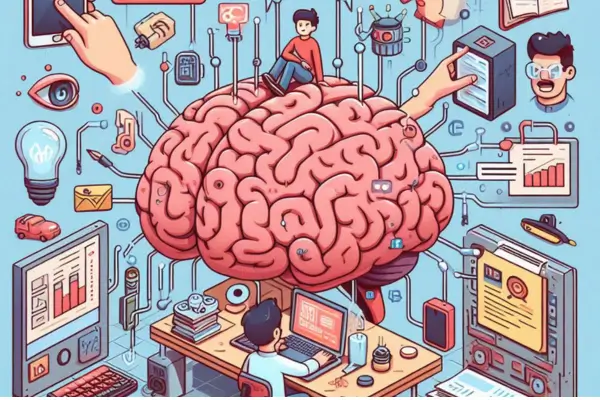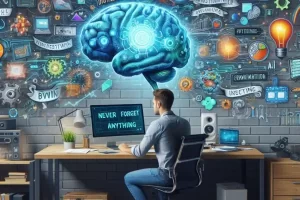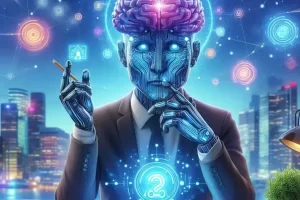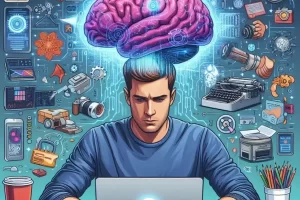Creativity isn’t just about inspiration — it’s about organization, iteration, and connection. Whether you’re a writer, designer, entrepreneur, or content creator, your best ideas often emerge when you have the right structure to catch them, shape them, and grow them.
By building a second brain — supported by artificial intelligence (AI) — you can make your creative process faster, more enjoyable, and more consistent. Instead of waiting for creativity to strike, you’ll have a system that helps you create on demand.
In this article, you’ll learn how to design a creative system that uses your second brain and AI to go from idea to output — without burnout or chaos.
Why Creative People Need a System
Great creators don’t rely only on talent. They build systems to:
- Capture inspiration
- Develop ideas over time
- Reuse and remix old content
- Stay consistent under pressure
- Reflect and improve their craft
Without a system, you risk:
- Losing your best ideas
- Starting from scratch every time
- Struggling with blank pages
- Forgetting what worked before
Your second brain becomes your creative memory, and AI becomes your creative assistant.
Create a Creative Vault in Your Second Brain
Start by building a space for all your creative raw material.
Sections to include:
- 💡 Idea bank
- 🎯 Project tracker
- 🧠 Inspiration library (quotes, articles, visuals)
- 🛠 Content templates and frameworks
- 📝 Drafts and works-in-progress
- ♻️ Repurposing ideas
Every time you think of something, hear something, or see something that could spark content, store it here.
Let AI help:
“Categorize these 10 ideas by format and theme.”
“Summarize this creative brief into a one-paragraph concept.”
“Suggest where this note fits in my creative system.”
Use AI to Generate and Expand Ideas
Turn your rough thoughts into creative gold with AI:
Prompts to try:
- “Give me 5 angles on this topic for different audiences.”
- “Turn this sentence into an opening paragraph for a blog post.”
- “Generate Instagram caption ideas based on this concept.”
- “What metaphors could I use to explain this idea?”
AI helps you move from fragment to form, fast.
You can also create your own custom GPT or template that mimics your tone and structure — ideal for ongoing content creation.
Connect Ideas Across Time and Topics
Creativity often happens at the intersection of ideas. Use your second brain to:
- Link past notes to current projects
- Find patterns or recurring themes
- Surface forgotten drafts that fit new goals
Ask AI:
“What older ideas relate to this new theme I’m exploring?”
“Which drafts have potential for completion or repurposing?”
“Cluster my past content by topic or emotional tone.”
This builds a creative network, not a collection of isolated files.
Create and Customize Content Templates
Templates save time and create consistency.
Examples to build:
- Blog post structure (hook → value → CTA)
- YouTube script format
- Carousel or tweet thread templates
- Storytelling framework
- Email newsletter layout
- Slide deck outline
Let AI help you:
“Build a blog post using the storytelling template and this topic.”
“Adapt this post into a tweet thread using the PAS (Problem-Agitate-Solution) format.”
“Turn this long article into a LinkedIn carousel plan.”
Now your creativity has repeatable flow, not just scattered sparks.
Track Your Creative Projects and Progress
Use your second brain to stay organized as you create.
Track:
- 📋 Project status (idea, draft, editing, published)
- 🧭 Creative goals (weekly/monthly content targets)
- 🔁 Repurposing plans
- 🧪 Experiments (new formats, topics, platforms)
Use views by:
- Platform
- Status
- Format
- Publish date
Let AI assist:
“Show me unfinished drafts older than 30 days.”
“Suggest which finished posts I could repurpose this month.”
“Summarize my creative output this quarter.”
This keeps momentum flowing — even on low-energy days.
Reflect, Refine, and Improve
The best creators don’t just create — they evolve.
Use AI to review your process:
“Which content performed best and why?”
“What feedback have I received that could improve my writing?”
“What themes are showing up in my work lately?”
Add a weekly or monthly creative review:
- What did I create?
- What inspired me?
- What felt easy or hard?
- What do I want to try next?
Your second brain becomes your creative mirror.
Build a Creative Rhythm — Not Just a Schedule
Structure supports creativity when it works with you, not against you.
Tips:
- Capture ideas daily — even if you don’t use them immediately
- Batch creative tasks (ideation, writing, editing, publishing)
- Use templates to reduce friction
- Let AI handle low-energy phases like outlining or rough drafting
- Reflect regularly to stay aligned with your voice and purpose
Prompts to try:
“What content could I create today based on my mood and energy?”
“Which old ideas could I combine in a fresh way?”
“Help me generate a week of content using minimal effort.”
Your second brain gives you freedom to explore, and AI gives you structure to deliver.
Real-Life Example: The Full-Time Creator
Let’s say you publish content across YouTube, a blog, and social media.
Your creative second brain includes:
- A content vault of 300+ raw ideas
- A dashboard tracking all drafts and formats
- AI-generated outlines and rough drafts
- Templates for scripts, tweets, and blog posts
- A weekly reflection that guides next week’s creative focus
You never run out of ideas — and you never start from scratch. You create with clarity, speed, and joy.
Final Thoughts: Creativity Needs a System
Inspiration is powerful — but systems are what bring ideas to life.
With a second brain and AI:
- You store and shape your creativity
- You reduce creative burnout
- You publish more consistently
- You evolve your style, voice, and impact
The goal isn’t to force creativity. The goal is to support it — every day.
So build the vault. Capture the sparks. Let AI assist. And create your best work — with confidence and flow.




